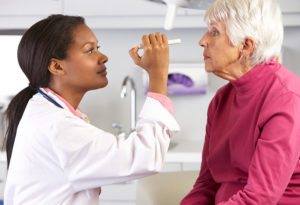Loss of Vision and Seniors

Home Care Water Mill NY: Loss of Vision and Seniors
Individuals who are age 65 and over are found to have an increasing risk of severe eye problems. Eye problems are considered severe when loss of vision makes it difficult or impossible to perform the everyday tasks of living. According to the American Foundation for the Blind, two-thirds of the legally blind population is seniors who lost vision as a result of age-related eye diseases. The top four eye diseases that result in vision loss in this age group are age-related macular degeneration, cataracts, diabetic retinopathy and glaucoma.
Unfortunately, early detection is not easy as these diseases offer little in the way of warning signs and symptoms. For this reason, as a family caregiver, it’s important to make sure that your loved one makes their yearly comprehensive eye exam. In addition, helping them maintain a lifestyle that promotes healthy eyes can help them see long into the future.
A Healthy Eye Lifestyle
Just what is a healthy eye lifestyle? Like the rest of your body, your eyes love nutritious food and exercise.
Diet
Two carotenoid antioxidants are prominent in eye tissue and have been shown to be supportive of healthy eyes—lutein and zeaxanthin. The macula of the eye (the central portion of the retina) draw in these two carotenoids where they absorb up to 90 percent of blue light and help maintain one’s vision, protecting the eyes against light-induced oxidative damage. A study reported in the American Journal of Epidemiology, Ophthalmology and Archives of Ophthalmology reported that consuming higher levels of these two nutrients in the diet resulted in lower rates of age-related macular degeneration. Foods rich in these carotenoids include leafy greens, particularly kale and spinach, egg yolks, corn, orange pepper, kiwi fruit, grapes, orange juice and different types of squash.
Exercise
Exercise has been shown to not only reduce the risk for these eye diseases, but also for the diseases that causes them—such as type 2 diabetes. Uncontrolled diabetes damages the delicate arteries in the retina, leading to diabetic retinopathy and the potential loss of vision. The key seems to be moderate intensity, low-impact exercise such as aerobics, swimming, bicycling or walking. The magic numbers? At least 30 minutes of exercise for 5 days of the week.
Home Care Provider
If your loved one is unable to perform the everyday activities of living, consider obtaining the services of a home care provider. These professionals can help with light housekeeping, assist with daily hygiene, prepare eye-healthy meals and perform errands such as grocery shopping. They can help keep your parent safe as they navigate through their home, accompany them on walks, and provide the social engagement so important to seniors.
Resources
http://www.afb.org/info/blindness-statistics/adults/special-report-on-aging-and-vision-loss/235
http://lpi.oregonstate.edu/mic/dietary-factors/phytochemicals/carotenoids#blue-light-filtering
- The Hidden Safety Benefits of an Organized Home - April 3, 2025
- Artful Home Care Presents Planning Your Legacy: An End-of-Life Strategy Session - March 27, 2025
- Celebrate National Garden Month with Your Senior - March 19, 2025

